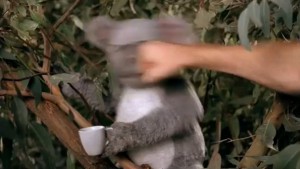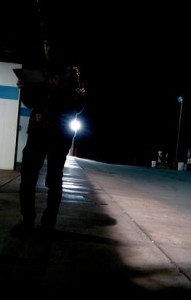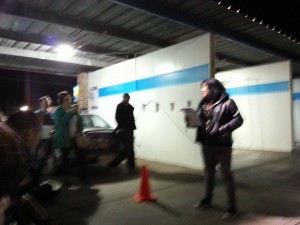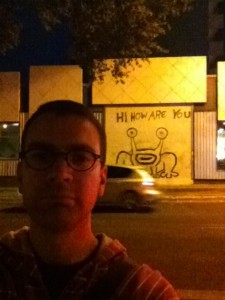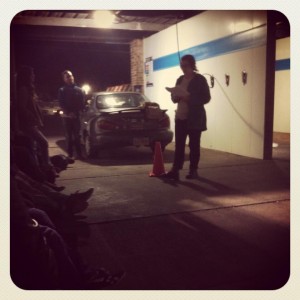Bleed Through by Michael Davidson
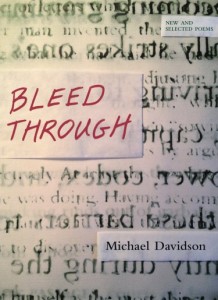 Bleed Through
Bleed Through
by Michael Davidson
Coffee House Press, Dec 2013
256 pages / $17.95 Buy from Coffee House or Amazon
“Perhaps having power is like having images.” If the concentration of images behaves gravitationally, then may we be approaching a point of collapse? Sure are a lot of pictures out there these days. The basic law of structure formation in the universe is collapse. And perhaps ‘having’ images is an affliction linked to memory, that trick of consciousness which allows humans to substitute pronouns like me and I, us and you, into the visions that bubble up during the increasingly rare moments during which one is not in a state of interface. It seems we have ever more such ‘moments’ to cope with. One inverse outcome of the surveillance state is we now have a population which is pumping images into circulation as never before. Michael Davidson’s career retrospective Bleed Through resists this proliferation as a collection and yet accedes, on a poem-to-poem basis, to the idea that even an initially smooth distribution of matter will fall in upon itself. Images are conflated with words, and disintegrate from line to line, blurring across the sparsely punctuated sentences, as in Ready to Hand:
in which a memo
is written, black crows
perch on the ledge
a small man below
becomes an object
and I seize it, it
comes off in my hands
like a handle
where there had been an intention
not to hurt
but to effect change
I wrote out the words
as though placing my hands
on a throat
it felt soft
and the blood was familiar
like middle C…
Davidson is well aware of a kind of useful violence latent in the process of reference as a professor of English, but in his poetry he seems to allow himself a moment of reflection. The title suggests that whatever is released by trying to grasp a scene, thing, or person is vital residue, but that the writing itself is in one sense confinement of the energy that suffuses the subject. Confinement here is a communal condition, and materializes as poetry, as criticism, and as image, in ways that are transparent about leaving something out. The ‘leaving something out’ is critical to allowing the subjects room to breathe an air of impossibility, which is what makes these poems semblances of life as a professor. A group of new poems is called ‘Bad Modernism’, scenes ‘between rationalism and whatever is left out’. The subjects that dwell here, in the most recent poems, generally resist being totalized, by way of their gentle intrusions into, and unexplained exits from, the world of each poem. While Davidson’s poetry is often grouped with the language movement, this is probably a bit inaccurate. While sometimes upending grammarians and often explicit about the pitfalls of language, a lyric relationship is still often present, if immaterial. His major output has been criticism, not poems, over the last decade, and this collection, although this collection is hailed as ‘A book we have needed for a very long time‘. I don’t think there’s any literature vital to our survival as a species, but I’m a pessimist unlike Ron Silliman. A grouping of things –systems, signs, speakers– will eventually not exert enough pressure outwards in aggregate to support its superstructure, and this is when collapse is imminent.
The collection spans thirty-five years of poetry, and narrows the work down to a single volume, so it is a well-contained environment. The distribution of the pronouns he uses changes as the reader moves from the older to the newer books, and recently the second-person singular has populated like wildfire in zones that used to be by and large by a first-person, and permutations of the third person. One of Davidson’s new and previously unpublished poems, The Friend, closes when “even the pronoun is laced with lime / as you pack it, ball and powder, / into a long gun, fire / and the report knocks you dead.” The friend in question turns away from the I, and dances gavottes on his back with his wife, turning the narrator into a piano of doubt. But the piano starts to sound like the same melodic register after some time. The same philosophical problems are sounded out via collage. Sometimes sounds of the program of inclusivity and access, sometimes reports that knock someone dead, but always the distant thunder of personal catastrophe bound up with the language of violence and questions about reference, as in the chilling ‘Before the Event’:
he meant a street lamp
she glowed over roiling water
spread along a passage
from him to her
in the street the cars
rolled along the pavement,
he thought
to point her out
among the stars
her womb a cup
his cock the handle
simple blackness
with a plan
like a man about to
mean something.
This poem displays a high correlation between sexual violence and some of the essential components of anglo-american language philosophy which has risen to power in the academy in the aftermath of Wittgenstein. Davidson’s objections to the way of living prevalent in the current academic labor force are present in different ways throughout the collection, although he has been affiliated with UC-San Diego in some capacity for over 30 years. Language poetry at its worst draws attention to its own ineffability while lording the power of the maker in a snide, academic way.There exists no image that contains the pain of having one’s home ravaged by a storm. But one can have so-called ‘philosophical’ interests and admit to being powerless before them. Language poetry at its best seems to perform a collapse of the rules of its system for a user of the language. Davidson’s work is filled with such moments of open vulnerability before the operations of the various systems. After one listens to so much loud music, deafness falls, but once everything is pictured what will become of the shadows?
December 23rd, 2013 / 12:00 pm
Making the Scene: Michael Davidson Reports from a Car Wash in Austin
Poetry readings suck. They are exercises in the worst kind of narcissism: the narcissism of a bad actor. There is nothing worse than having to endure two hours of bullshit from people you don’t even like. If you attend poetry readings regularly, then you are probably a wanna-be poet. And if you behave yourself at such readings, then you are definitely a loser. If you want to get a poet’s attention, here’s a simple formula: attend a poetry reading, politely approach a poet, punch the poet in the mouth. Not only will you get the poet’s attention, you will have accomplished something that not even the poet you’ve come to see could have accomplished: the creation of an almost pure act of poetry.
Of course, you could also stay home and write poems. But that would require you to be comfortable with long periods of loneliness, anxiety associated with the feeling of missing something, and mostly heart-breakingly intense bouts of solitude. For those of you who can’t bear the responsibility of becoming a poet, you can continue to attend poetry readings and, after you leave, perform the ritual of bitching and complaining about how shitty they are–and how awful so-and-so’s stuff is–as you drive/are driven to the nearest Taco Bell or whatever.
I attend poetry readings very infrequently. And when I do I do it for two reasons: one, I have convinced myself beforehand that I will learn something about writing poetry (by attending and actually listening to the poets read stuff at the reading), and two, I believe I will discover something about the mystery of existence (I know, stupid romantic). Simply put: people, signs, architecture–lots of things–intrigue me. Especially super fucking weirdo, but seemingly simple, things. Like the poetry reading that took place in a car wash in Austin, Texas, last week. Below, I provide you with a scintilla of evidence that poetry readings don’t have to suck, that somewhere in the world poetry people are trying to do it right, attempting to make–in their very own uniquely foolhardy way–a little miracle (which, by the way, I have always associated with crime).
Michael Davidson (aka herocious) reports from Austin on the Sad Sad Sad Fest: A Car Wash Reading (first posted by Michael on Alt Lit Gossip):
“I tweet: I’m reading a tiny story aloud today at a car wash on MLK and Airport in Austin. Come say hi at 7pm :) I don’t tell anyone I work with about the event, not even to make small talk in the copy room.”
“At home I practice reading aloud the story I plan on sharing at the event. I delete words I don’t like, then I delete entire sentences I don’t like.”
“We discuss a meeting place. We decide on 21st and Guadalupe, the same corner with the Daniel Johnston alien frog.”
“Alicia Fyne, the event organizer, is in her car in the far left bay, just like she said she would be. There are people packed into her car.”
“We meet Alicia Fyne, Andrew Hilbert, Joseph Green, Cheryl Couture, No Glykon. There is beer. There are flasks of whiskey. In other bays at the car wash, people are washing their cars. A friend shows up: David Nguyen. Other people enter the far left bay, lean against the tiled walls, introduce themselves. It’s fun. No one gives a shit.”
“To hold a reading where you least expect it. To hold a reading where it doesn’t fit in. Behind me I hear people ordering from Popeye’s.”
The Sad Sad Sad Fest was the name given to Alicia Fyne’s monthly readings series wait . . . what? The writers reading at Sad Sad Sad Fest on November 7, 2013: Michael Davidson, Cheryl Couture, Andrew Hilbert, No Glykon, Joseph Green, and Alicia Fyne.
Note: This post will be part of a series called, “Making the Scene”. The series seeks to report on readings that happen in your neighborhood. If you’ve got something to report, hit me up.
twitter: @janeysmithkills tumblr: kottonkandyklouds.tumblr.com

